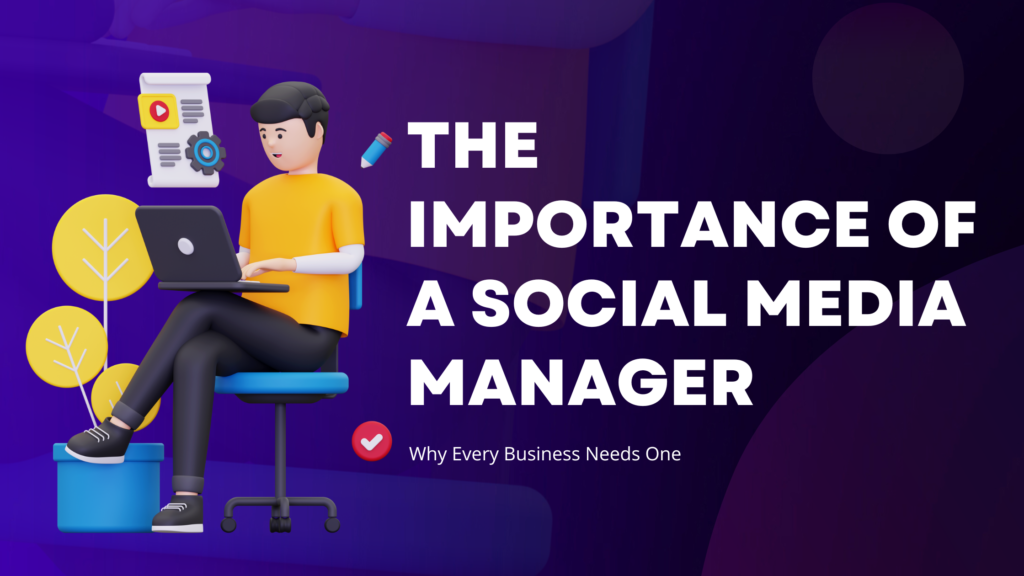In today’s digital age, social media has become an essential part of any business’s marketing strategy. With billions of people using platforms like Facebook, Instagram, Twitter, and LinkedIn daily, social media offers unparalleled opportunities to connect with your audience, build brand awareness, and drive business growth. However, effectively managing social media requires time, strategy, and expertise—that’s where a Social Media Manager comes in. Here’s why having a dedicated Social Media Manager is crucial for your business.

1. Strategic Planning and Execution
Social media is not just about posting content; it’s about crafting a well-thought-out strategy that aligns with your business goals. A Social Media Manager develops and implements a comprehensive strategy tailored to your brand’s needs. This includes selecting the right platforms, determining the best times to post, identifying key performance indicators (KPIs), and creating a content calendar. With a strategic approach, your social media efforts become more focused, efficient, and effective.
2. Building and Maintaining Brand Identity
Your brand’s voice, tone, and visual identity should be consistent across all social media platforms. A Social Media Manager ensures that every piece of content reflects your brand’s personality and values. They curate and create content that resonates with your audience, strengthens your brand identity, and maintains a cohesive look and feel. This consistency helps build trust and recognition among your followers.
3. Engaging with Your Audience
Social media is a two-way communication channel, and engagement is key to building strong relationships with your audience. A Social Media Manager monitors and responds to comments, messages, and mentions, ensuring that your followers feel heard and valued. By actively engaging with your audience, they can address questions, resolve issues, and foster a sense of community around your brand. This level of interaction not only boosts customer satisfaction but also enhances brand loyalty.
4. Staying Current with Trends
Social media is constantly evolving, with new trends, features, and algorithms emerging regularly. A Social Media Manager stays up-to-date with the latest changes and adapts your strategy accordingly. Whether it’s leveraging the latest Instagram feature, capitalizing on a viral trend, or adjusting to an algorithm update, they ensure your brand remains relevant and competitive in the fast-paced social media landscape.
5. Data-Driven Decisions
Effective social media management relies on data. A Social Media Manager uses analytics tools to track the performance of your posts, campaigns, and overall social media presence. By analyzing metrics such as engagement rates, click-through rates, and follower growth, they can determine what’s working and what’s not. This data-driven approach allows them to make informed decisions, optimize strategies, and continuously improve your social media efforts.
6. Managing Social Media Advertising
Paid advertising on social media is a powerful way to reach a larger audience and drive specific actions, such as website visits or product purchases. A Social Media Manager is skilled in creating and managing social media ad campaigns. They can target the right audience, set budgets, design compelling ads, and monitor the performance of your campaigns. This expertise ensures that your ad spend is used effectively, maximizing your return on investment (ROI).
7. Crisis Management
In the event of a PR crisis or negative feedback, how you respond on social media can make or break your brand’s reputation. A Social Media Manager is equipped to handle such situations with tact and professionalism. They can quickly address issues, communicate transparently with your audience, and take steps to mitigate damage. Having a skilled manager in place ensures that your brand navigates challenges smoothly and maintains its reputation.
Conclusion
In a world where social media plays a pivotal role in business success, having a dedicated Social Media Manager is essential. They bring the expertise, strategy, and creativity needed to harness the full potential of social media, helping your brand connect with its audience, build a strong online presence, and achieve its marketing goals. Whether you’re a small business or a large enterprise, investing in a Social Media Manager can drive significant growth and give you a competitive edge in the digital landscape.








